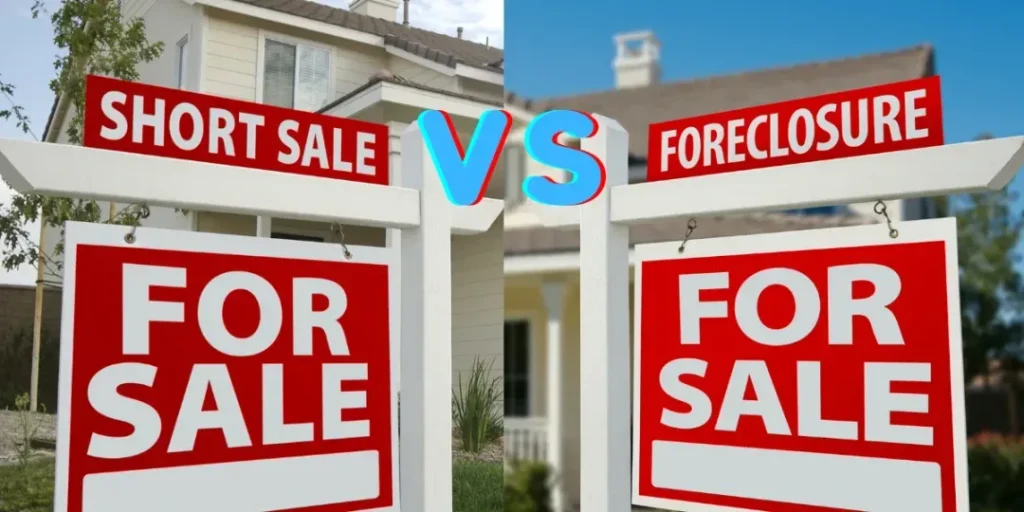Short Sale vs. Foreclosure – What’s the Difference?

Introduction
If you’re searching for “Short Sale vs. Foreclosure – What’s the Difference?”, you’re likely in a stressful and uncertain position. Perhaps you’re facing financial difficulty, struggling to keep up with your mortgage payments, or have already received a foreclosure notice. You may be wondering about the best option for getting out of your current situation without further damage to your financial health or credit score. The key points you’re looking for are clear: You need to know the differences between short sales and foreclosures, how each impacts your credit, the costs involved, and what the long-term consequences might be. You want clarity on which option may allow you to regain control of your finances with minimal damage or hassle.
Above all, you likely want to understand your options—perhaps you are simply looking for a way to avoid foreclosure, or maybe you’re weighing whether a short sale is worth it. You may also be concerned about how each option will impact your future, especially your ability to purchase a home again. You’re likely looking for practical advice and real, actionable steps that will lead you to a resolution. We will address these concerns head-on and provide insight into how a cash sale could also be a viable option for you.
Short Sale vs. Foreclosure: What’s the Difference?
If you’re facing financial trouble and struggling to make mortgage payments, you may be wondering about your options. The two most common routes for homeowners in this situation are short sales and foreclosures. Both of these options have significant financial consequences, but they’re very different in terms of process, impact on your credit, and long-term outcomes. Understanding the key differences between these two options can help you make an informed decision about your next steps.
A short sale occurs when a homeowner sells their property for less than the amount owed on the mortgage, with the lender’s approval. This option allows the homeowner to avoid the complete loss of their home, but it requires a lengthy process and the lender’s cooperation. Foreclosure, on the other hand, happens when the lender takes legal action to seize the property after the homeowner fails to make mortgage payments. This process is often faster and can result in the homeowner losing their home without any say in the matter.
In this article, we’ll explore the key differences between short sales and foreclosures, the pros and cons of each, and how they could impact your financial future. By the end of this post, you’ll have a better understanding of your options and the potential consequences of each choice.
What Is a Short Sale?
A short sale happens when a homeowner sells their property for less than the amount owed on their mortgage, with the lender’s approval. This is typically a last resort for homeowners who are underwater on their mortgage (owing more than the property is worth) and can no longer afford to make their payments. A short sale allows the homeowner to avoid foreclosure and may be less damaging to their credit.
In a short sale, the lender agrees to accept the sale proceeds, even though they won’t fully cover the mortgage balance. The homeowner may have to prove financial hardship to convince the lender to approve the short sale. While this option can help homeowners avoid foreclosure, it’s not an easy or quick process. The homeowner must list the property, negotiate with potential buyers, and wait for the lender’s approval.
Advantages of a Short Sale:
- Avoid Foreclosure: A short sale allows homeowners to avoid the more severe consequences of foreclosure. While it still negatively impacts your credit, it is generally less damaging than a foreclosure.
- Debt Forgiveness: In some cases, the lender may forgive the remaining balance on the mortgage after the sale. This means that the homeowner may not have to pay the difference between the sale price and the mortgage balance.
- Shorter Timeframe: Compared to foreclosure, the short sale process can take less time, although it still may take several months.
- Better Impact on Credit: A short sale may have a less severe impact on your credit score than foreclosure. While it will still negatively affect your credit, it can be less damaging in the long run.
Disadvantages of a Short Sale:
- Lender Approval Required: The lender must approve the sale, which can make the process complicated and time-consuming. It’s not guaranteed that the lender will accept the short sale.
- Possible Deficiency Judgment: If the lender doesn’t forgive the remaining mortgage balance, the homeowner may be required to pay the difference, which can lead to a deficiency judgment.
- Potential Tax Consequences: In some cases, the homeowner may be required to pay taxes on the forgiven debt, which can create a tax burden.
If you want to avoid foreclosure and reduce the impact on your credit, a short sale could be a viable option. However, it’s essential to weigh the potential costs, time, and risks involved.
What Is Foreclosure?
Foreclosure is a legal process in which a lender takes possession of a property after the homeowner fails to make mortgage payments. The lender can sell the property at auction to recover the outstanding mortgage balance. Unlike a short sale, which involves the homeowner selling the property, foreclosure is initiated by the lender and results in the homeowner losing their home.
Advantages of Foreclosure:
- Quick Resolution: Foreclosure can happen much faster than a short sale. In some cases, the entire process may take as little as six months to complete.
- No Negotiation: In a foreclosure, the lender takes control of the property, so the homeowner doesn’t have to negotiate the sale price or deal with potential buyers.
- No Deficiency Judgment (in some cases): Depending on state laws, homeowners may not be responsible for paying the remaining mortgage balance after foreclosure. However, this is not always the case.
Disadvantages of Foreclosure:
- Severe Impact on Credit: Foreclosure has a much more significant negative impact on your credit score than a short sale. It can stay on your credit report for up to seven years, making it difficult to secure a loan or mortgage in the future.
- Loss of the Property: In foreclosure, you lose your home and any equity you may have built. Unlike a short sale, you won’t have the option to sell the property and walk away with any proceeds.
- Public Record: Foreclosure is a public process, meaning that it will be reported in public records and could negatively affect your reputation.
- Eviction Risk: After the foreclosure process is complete, homeowners may be evicted from the property, which can cause additional stress and hardship.
Why Foreclosure May Be Worse:
While foreclosure may offer a quicker resolution, it’s important to understand that the consequences can be much more severe than a short sale. The damage to your credit score can be long-lasting, and you may find it difficult to rent or buy a home for several years. Additionally, the emotional toll of losing your home can be overwhelming, and the eviction process can add to the stress.
If you’re facing foreclosure and need immediate help, you may want to consider selling your house for cash as a faster and less damaging alternative. Our page on How to Stop the Bank from Foreclosing on Your Georgia House outlines steps you can take to avoid foreclosure and sell your house quickly.
The Financial Impact: Short Sale vs. Foreclosure
The financial impact of a short sale and foreclosure can vary significantly, and it’s crucial to understand the potential costs involved in each process.
Short Sale Costs:
- Real Estate Agent Fees: A real estate agent will typically be involved in a short sale, and they charge commissions that usually range from 5% to 6% of the sale price.
- Potential Tax Liability: Depending on your circumstances, you may be required to pay taxes on the forgiven mortgage debt. This is something to keep in mind when considering a short sale.
- Outstanding Mortgage Balance: If the lender doesn’t forgive the remaining balance on the mortgage, you may be required to pay the difference.
Foreclosure Costs:
- Legal Fees: In the foreclosure process, the lender incurs legal fees and passes these costs on to the homeowner.
- Loss of Equity: In a foreclosure, you lose your home and any equity you may have built up. This is a significant financial setback.
- Eviction Costs: After foreclosure, you may have to pay for moving costs or temporary housing.
The financial burden of foreclosure can be difficult to navigate. For additional insight into the costs of foreclosure, the Upsolve offers information on how foreclosure laws work and provides resources for homeowners in distress. It’s important to know your rights and the potential costs involved in the foreclosure process.
Why You Might Want to Sell Your House for Cash
If you’re looking for a quick and straightforward way out of your financial hardship, selling your home for cash could be the best option. Unlike short sales and foreclosures, a cash sale allows you to sell your home quickly without the lengthy process or the damage to your credit that comes with foreclosure.
A cash sale typically closes within a week or two, and you won’t have to pay agent commissions or repair costs. If you’re facing foreclosure or financial distress, a cash sale can be a viable solution. You can avoid the negative impact of foreclosure and receive cash for your property, which you can use to settle other debts or move forward with your life.
If you’d like to explore this option, reach out to us today for a no-obligation cash offer.
Conclusion: Short Sale vs. Foreclosure – Which Is Better for You?
In the end, choosing between a short sale and foreclosure depends on your unique situation. A short sale can offer a less damaging impact on your credit compared to foreclosure, but it often requires a lengthy approval process and lender cooperation. Foreclosure, while faster, can lead to severe long-term consequences, such as significant credit damage and the emotional and financial strain of losing your home.
If you’re looking to avoid the negative effects of both short sales and foreclosures, selling your home for cash could be the best solution. With Trinity REsolutions, we specialize in helping homeowners in difficult situations by offering fast cash sales. You can sell your property in a matter of days, avoid the lengthy process of foreclosure, and eliminate the stress associated with a short sale. Selling your home for cash allows you to walk away with cash in hand, giving you the opportunity to rebuild your financial life without the lasting impact of foreclosure or a short sale.
